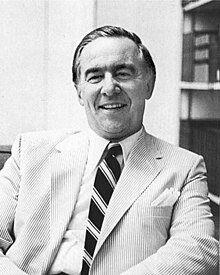Thomas A. Spragens | |
|---|---|
 Spragens c. 1972 | |
| 17th President of Centre College | |
| In office November 11, 1957 – November 16, 1981 | |
| Preceded by | Walter A. Groves |
| Succeeded by | Richard L. Morrill |
| President of Stephens College[a] | |
| In office December 1, 1952 – November 11, 1957 | |
| Preceded by | Homer P. Rainey |
| Succeeded by | Seymour Smith |
| Personal details | |
| Born | Thomas Arthur Spragens April 25, 1917 Lebanon, Kentucky, U.S. |
| Died | February 11, 2006 (aged 88) Columbia, South Carolina, U.S. |
| Resting place | Bellevue Cemetery |
| Political party | Democratic |
| Spouse |
Catharine Smallwood (m. 1941) |
| Children | 3 |
| Education | University of Kentucky (BA) |
| Signature | |
Thomas Arthur Spragens (/ˈspreɪ.ɡɪnz/ SPRAY-ginz; April 25, 1917 – February 11, 2006) was an American administrator who was the 17th president of Centre College in Danville, Kentucky. A graduate of the University of Kentucky, Spragens worked for the state and federal government early in his career, before joining the staff at Stanford University as a presidential advisor. He was the president of Stephens College in Columbia, Missouri, for a five-year term, and left Stephens to go to Centre in 1957.
The first Centre president who was not a member of the clergy, Spragens worked to lessen the ties between the college and the Presbyterian Church, which led to a significant rise in students reporting that they were non-denominational; it also led to attendance at chapel becoming optional for students. Spragens was an effective fundraiser for the school; his Fund for the Future Campaign ultimately raised $34 million. He was instrumental in the integration of the school, and admitted Centre's first black student in 1962. The same year, he led an effort to consolidate the school's women's department, formerly the Kentucky College for Women, onto Centre's campus. Many parts of campus were upgraded during his presidency; after twenty years, three quarters of Centre's facilities had been either built or renovated. During his term, which ended in 1981, Centre's student enrollment and faculty numbers both nearly doubled, its endowment increased, and the property value of its campus rose.
He was selected by two governors to be a part of commissions which studied higher education in Kentucky, and was a part of the American Association of Colleges and Universities, the Southern Association of Colleges and Schools, and the American Council on Education at different times. He was active in Democratic Party politics, and was a delegate to the 1968 Democratic National Convention in support of Senator Eugene McCarthy. Additionally, he was a part of an effort which culminated in the 1962 founding of what is now the Southern Collegiate Athletic Conference, of which Centre remained a charter member until 2011.
Cite error: There are <ref group=lower-alpha> tags or {{efn}} templates on this page, but the references will not show without a {{reflist|group=lower-alpha}} template or {{notelist}} template (see the help page).